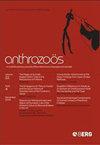创伤后应激障碍退伍军人精神科服务犬安置与伴侣睡眠模式的初步分析
IF 2.3
2区 农林科学
Q2 SOCIOLOGY
引用次数: 0
摘要
摘要被诊断为创伤后应激障碍(PTSD)的退伍军人的伴侣面临着各种各样的挑战,目前尚不清楚精神科服务犬是否会干扰他们的睡眠,或者提供与有限的退伍军人文献中看到的类似的好处。作为一项大型临床试验的一部分,研究了精神科服务犬对患有创伤后应激障碍的退伍军人及其家人的疗效,这项研究主要关注退伍军人伴侣的睡眠模式(n = 88),包括主观(临床验证的自我报告调查)和客观睡眠测量(活动记录仪)。采用线性回归分析随访时各组(干预组与对照组)的差异,控制基线评分。结果显示两组间主观调查无显著差异(p = 0.15;P = 0.75)和客观活动测量(P = 0.06-0.98)。这表明,精神科服务犬不会扰乱伴侣的睡眠,也不会给伴侣的睡眠带来任何好处。伴侣的睡眠模式在基线时与国家标准相当,并在随访中保持在这一水平。最终,通过主观和客观的测量,我们发现精神科服务犬对退伍军人伴侣的睡眠没有影响。试验注册:ClinicalTrials.gov标识符:NCT03245814。感谢所有的合作伙伴、退伍军人和服务犬,他们使这项研究成为可能。披露声明作者未报告潜在利益冲突。本研究由美国国立卫生研究院(NIH)的Eunice Kennedy Shriver国家儿童健康与人类发展研究所(NICHD)和国家补充与综合健康中心(NCCIH)支持,奖励号为R21HD091896;和麦里克宠物护理公司。内容完全是作者的责任,并不一定代表美国国立卫生研究院的官方观点。本文章由计算机程序翻译,如有差异,请以英文原文为准。
A Preliminary Analysis of Psychiatric Service Dog Placements and Sleep Patterns of Partners of Veterans with PTSD
ABSTRACTPartners of veterans diagnosed with posttraumatic stress disorder (PTSD) are at risk of a variety of challenges, and it is unknown whether psychiatric service dogs are disruptive to their sleep or provide similar benefits that are seen in the limited literature on veterans. As part of a larger clinical trial examining the efficacy of psychiatric service dogs for veterans with PTSD and their families, this study focused on sleep patterns of veterans’ partners (n = 88), incorporating both subjective (clinically validated self-report surveys) and objective sleep measures (actigraphy). Linear regression was used to analyze differences in relation to group (intervention versus control) at follow-up, controlling for baseline score. Results revealed no significant differences between groups for both the subjective surveys (p = 0.15; p = 0.75) and the objective actigraphy measures (p = 0.06–0.98). This suggests that psychiatric service dogs are not disruptive, nor do they provide any benefits to partner sleep. Partners had sleep patterns on par with national norms at baseline and remained at such levels at follow up. Ultimately, using both subjective and objective measures, we found no impact of psychiatric service dogs on the sleep of veterans’ partners.Trial registration: ClinicalTrials.gov identifier: NCT03245814.KEYWORDS: Animal-assisted interventionassistance doghuman–animal interactionmilitary families AcknowledgementsThank you to all the partners, veterans, and service dogs who made this study possible.Disclosure StatementNo potential conflict of interest was reported by the authors.Additional informationFundingThis work was supported by the Eunice Kennedy Shriver National Institute of Child Health and Human Development (NICHD) and the National Center for Complementary and Integrative Health (NCCIH) of the National Institutes of Health (NIH) under award number R21HD091896; and Merrick PetCare. The content is solely the responsibility of the authors and does not necessarily represent the official views of the National Institutes of Health.
求助全文
通过发布文献求助,成功后即可免费获取论文全文。
去求助
来源期刊

Anthrozoos
农林科学-兽医学
CiteScore
3.40
自引率
18.80%
发文量
43
审稿时长
>36 weeks
期刊介绍:
A vital forum for academic dialogue on human-animal relations, Anthrozoös is a quarterly, peer-reviewed journal that has enjoyed a distinguished history as a pioneer in the field since its launch in 1987. The key premise of Anthrozoös is to address the characteristics and consequences of interactions and relationships between people and non-human animals across areas as varied as anthropology, ethology, medicine, psychology, veterinary medicine and zoology. Articles therefore cover the full range of human–animal relations, from their treatment in the arts and humanities, through to behavioral, biological, social and health sciences.
 求助内容:
求助内容: 应助结果提醒方式:
应助结果提醒方式:


